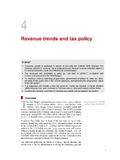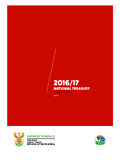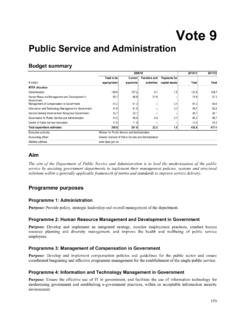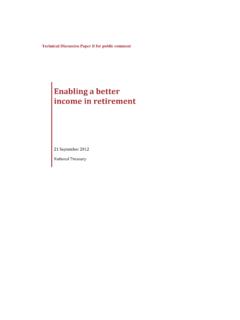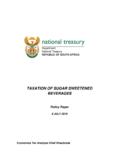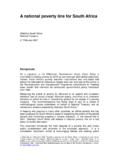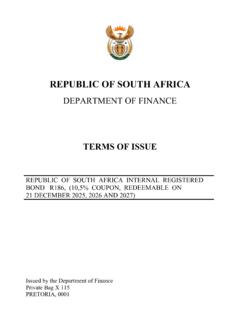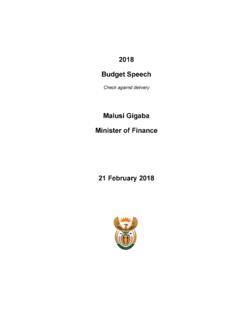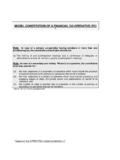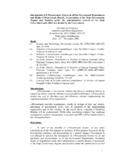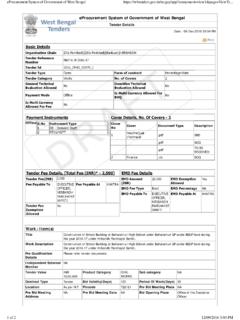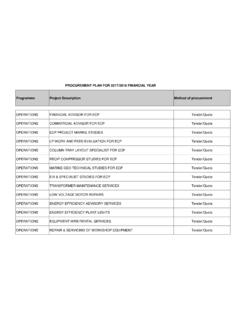Transcription of Standard for a Construction Procurement System
1 Standard for a Construction Procurement System 30th November 2012 (Draft) Comment on this Standard may be submitted by 08 February 2013 to: The Director-General National Treasury Private Bag X115 PRETORIA 0001 All comments must be marked for the attention of Mr Jayce Nair or to Ms Moipone Ramipone and may be either posted to the above address, transmitted by fax to 086 513 0008 or by email to Introduction Procurement is the process which creates, manages and fulfils contracts. Supply chain management (SCM) on the other hand is the design, planning, execution, control and monitoring of supply chain activities in the delivery of goods, services or works, with the objective of creating net value and providing oversight and co-ordination of information and finances within the supply chain. SCM is far broader than Procurement and constitutes a major component of government s Infrastructure Delivery Management System .
2 This Standard focusses on the Construction Procurement System which forms a part of the supply chain management System which is described in the Standard for an Infrastructure Delivery Management System . Procurement commences once a need for goods, services, or engineering and Construction works has been identified and ends when the goods are received, the services or Construction works are completed. Procurement processes and procedures need to be managed and controlled. Accordingly, governance activities need to be linked to the milestones in the Procurement process. At the same time, policies are required to govern the usage and application of certain Procurement procedures, requirements for recording, reporting and risk management, and procedures for dealing with specific Procurement related issues, etc. A Procurement System comprises not only Procurement processes but also: a) rules and guidelines governing procedures and methods; b) Procurement documents which include terms and conditions, procedures and requirements; c) risk / quality oversight (governance and performance) controls; and d) organisational policies which deal with issues such as: i) the usage and application of particular Procurement procedures; ii) requirements for recording, reporting and risk management; iii) procedures for dealing with specific Procurement issues; iv) the usage of Procurement to promote social and developmental objectives; and v) the assignment of responsibilities for the performance of activities.
3 A public Procurement System in South Africa needs to be developed around the South African constitutional imperatives for a public Procurement System , namely that the System : a) must be fair, equitable, transparent, competitive and cost-effective; and b) may provide for categories of preference. The Construction Industry Development Board (CIDB) has developed standards which provide procedures and methods which are required by law to be applied to certain key Procurement processes, as well as a series of best practice guidelines, which have now been incorporated into the recently published ISO 10845 standards for Construction Procurement . These standards have been developed around the primary and secondary Procurement System objectives embedded in the Constitution of the Republic of South Africa (Act 108 of 1996) for a Procurement System which may be expressed in qualitative terms as follows: a) Fair: the process of offer and acceptance is conducted impartially without bias, and provides participating parties simultaneous and timely access to the same information.
4 B) Equitable: the only grounds for not awarding a contract to a tenderer who complies with all requirements are restrictions from doing business with the organization, lack of capability or capacity, legal impediments and conflicts of interest. c) Transparent: the Procurement process and criteria upon which decisions are to be made shall be publicized and made publicly available with reasons for those decisions, and with the possibility of verifying that criteria were applied. d) Competitive: the System provides for appropriate levels of competition to ensure cost-effective and best value outcomes. e) Cost-effective: the processes, procedures and methods are standardized with sufficient flexibility to attain best value outcomes in respect of quality, timing and price, and the least resources to effectively manage and control Procurement processes. f) Promotion of other objectives: the System may incorporate measures to promote objectives associated with a secondary Procurement policy subject to qualified tenderers not being excluded and deliverables or evaluation criteria being measurable, quantifiable and monitored for compliance.
5 The primary purpose of this Standard is to establish a Construction Procurement System for an institution to use in fulfilling its obligations in the Procurement of goods, services and engineering and Construction works within the Construction industry in: a) compliance with requirements established in terms of the: i) Constitution of the Republic of South Africa, 1996 (Act No 108 of 1996); ii) Public Finance Management Act or 1999 (Act 1 of 1999) iii) Construction Industry Development Board (Act 38 of 2000); and iv) other pertinent Acts; and b) a manner which: i) embraces national and international best practice; and ii) is auditable. Institutions who are required to apply this Standard need to complete Annexure B allocated designated persons to perform duties, provide delegations and set parameters associated with Procurement procedures. yes Need for Procurement established Is there an emergency situation?
6 Apply negotiated procedure Are there only a limited number of contractors available? Is the value less than or equal to a threshold Apply shopping procedure Is the value above a threshold Apply quotation procedure Designated person awards contract Delegated authority awards contract Contract less than or equal to a threshold Contract above a threshold no yes Procurement processes provided for in the Construction Procurement System yes yes yes no no no Documentation Review Team accepts Procurement documents no Evaluation Panel evaluates submissions Invite quotations Documentation Review Team accepts Procurement documents Does quality form part of the evaluation points System ? Call for expressions of interest no Invite tender offers and apply selected Procurement procedure yes yes Construction Procurement committee Recommend award of contract? no Apply confined market procedure Is it necessary to prequalify tenderers or reduce the number of tenderers making submissions?
7 Evaluation Panel evaluates Tenders Expressions of interest no Framework agreement in place place no Apply task / batch /. package order procedure yes Delegated authority approves task / batch / package order Construction Procurement committee receives notification of approval Designated person authorises next phase yes Standard for a Construction Procurement System CONTENTS _Toc342398746 1 Scope 1 2 Terms, definitions and abbreviations 1 Terms and definitions 1 Abbreviations 4 3 Normative references 4 4 Requirements 6 General requirements 6 Conduct of those engaged in Construction Procurement processes or procedures 6 General requirements 6 Conflicts of interest 7 Evaluation of submissions received from respondents and tenderers 8 Non-disclosure agreements 9 Gratifications, hospitality and gifts 9 Breaches 10 Placing of contractors under restrictions 10 Procurement activities, key actions, responsibilities and gates 11 Roles and responsibilities in relation to the Procurement processes.
8 Activities and controls 18 General 18 Documentation Review Team 18 Evaluation panels 19 Construction Procurement Committee 23 Disposal Committee 24 Delegated Authority 24 Compliance monitoring 26 Complaints and challenges 27 Secondary Procurement policy 28 General 28 Permitted targeted Procurement procedures 29 Broad Based Black Economic Empowerment 29 Engaging members of the community in Construction works 30 Usage of Standard Procurement procedures 30 General 30 Framework agreements 33 Lists of pre-approved contractors 35 Disposals 36 Unsolicited proposals 36 Procurement documents 37 General 37 Standard forms of contract 37 Auction data 39 Standardised documents 39 Tender assessment schedules 39 Guarantees 39 Retention 39 Delay damages 39 Price adjustment for inflation 40 Insurances 40 Communications 41 Intellectual property rights 41 Disputes arising during the performance of a contract 41 Quality standards 41 Budgetary items 42 Calls for expressions of interest and invitations to submit tender offers 42 General 42 Advertising 42 Issuing of Procurement documents 42 Clarification meetings and issuing of addenda 43 Receipt and safeguarding of submissions 43 Opening of submissions 44 Evaluation of submissions 45 Notice to unsuccessful tenderers and respondents 45 Debriefing of respondents and tenderers 45 Written reasons for actions taken 46 Request for access to information 46 Award of contracts 47 General 47 Registration on a supplier database 47 Administration of contracts 48 General 48 Records and reporting 48 Authorised increase in the final contract amount 49 Invoicing 49 Occupational health and safety 49 Departures from procedures 49 Annexure A.
9 Overview of applicable legislation 50 A1 Constitutional imperatives for Procurement 50 A2 Applicable pieces of legislation 50 A3 Construction Industry Development Board Act 51 Annexure B: Designated persons, delegated authorities, the composition of teams, panels and committees and thresholds associated with Procurement procedures 53 B1 Designated persons 53 B2 Delegated authority to award a contract 59 B3 Composition of control and governance committees 60 B4 Thresholds relating to various Procurement procedures 61 B5 Insurance values 61 B6 Threshold for gifts 62 Annexure C: Adjudication procedures to challenge decisions made during the tender process 63 C1 General principles 63 C2 Notice of tender dispute adjudication 63 C3 Administrative procedures 63 C4 Tender dispute adjudicator s decision 63 Annexure D: Communications with unsuccessful respondents or tenderers 65 Letters to unsuccessful respondents or tenderers 65 Debriefing score sheet 65 Annexure E: Example of a performance report for an NEC3 Professional Service Contract 67 Construction Procurement System 1 November 2012 1 Scope This Standard establishes a Construction Procurement System within an institution for the Procurement of: a) goods, services and engineering and Construction works and disposals relating to the Construction industry; b) goods or services necessary for a new facility as delivered to be occupied and used as a functional entity; and c) temporary facilities.
10 The Standard does not apply to: a) the storage of goods and equipment following their delivery to an institution which are stored and issued to contractors or to officials ; b) the Procurement of non- Construction industry related goods and services or land, except as provided for in ); c) the sale, exchange, donation or letting of land; d) public private partnerships contemplated in Regulation 16 of the Treasury Regulations for Departments, Trading Entities, Constitutional Institutions and Public Entities issued in terms of the Public Finance Management Act, 1999; e) the conclusion of any form of land availability agreement; and f) leasing and rental of assets. NOTE 1 This Standard is consistent with legislation identified in Annexure A and embraces local and global Construction Procurement best practices. NOTE 2 The Construction Industry Development Board Act, 2000 (Act 38 of 2000) defines the Construction industry as the broad conglomeration of industries and sectors which add value in the creation and maintenance of fixed assets within the built environment.
